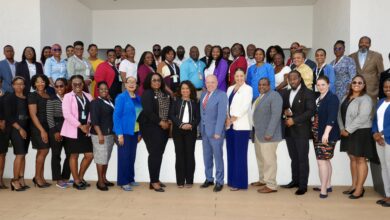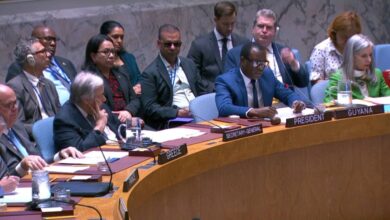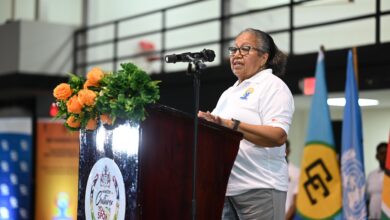The Pan American Health Organization (PAHO) office officially kicked off the new €6.85 million European Union funded initiative on climate change and health with the first Regional Partner Dialogue.
This virtual session, held on June 29th, brought together representatives from five regional organisations to facilitate discussions on the critical first steps towards implementation of the project across all CARIFORUM member countries. The Caribbean Institute for Meteorology and Hydrology (CIMH), the University of the West Indies (UWI), the Caribbean Public Health Agency (CARPHA), the Caribbean Climate Community Change Centre (CCCCC) and the CARICOM Secretariat will collaborate with PAHO and lend their technical expertise to the programme with a focus on strengthening climate resilience in regional health systems.
During the session, Team Leader, Green Economy and Resilience Support at the European Union, Bogdan Stefanescu, expressed the EU’s satisfaction at the strengthening of this multidisciplinary partnership between the EU and the Caribbean in the face of the common threat posed by climate change. He also noted the programme’s alignment with the European Green Deal, the EU Health Strategy, and the EU Strategy on Adaptation to Climate Change. Initial actions under the programme include the establishment of a Climate Change and Health Leaders’ Fellowship Programme, development and piloting of project proposals on Climate Change and Health and preparatory work on early warning systems and climate and health surveillance systems.
The EU/CARIFORUM project represents a regional push towards improved understanding of the current impacts of climate change on health and the need for effective planning in the sector for future climate variation. Programmme Manager, Sustainable Development at the CARICOM Secretariat, Amrikha Singh, highlighted that the project will allow CARICOM to continue to advocate at the international level for global action to address climate change as a developmental issue. Sub regional Program Coordinator, Caribbean, PAHO/WHO, Jessie Schutt-Aine outlined that over the five years the grant will allow partners to fund and facilitate bold projects to strengthen public health systems, adapt and prioritize country plans, foster leaders, and increase capabilities for decision making. Actions to support community engagement for the development of small-scale initiatives to raise awareness in target populations will also implemented.
Sixteen countries are expected to benefit from this programme. They are Antigua and Barbuda, Bahamas, Barbados, Belize, Cuba, Dominica, Dominican Republic, Grenada, Guyana, Haiti, Jamaica, St. Kitts and Nevis, St. Lucia, St. Vincent and the Grenadines, Suriname and Trinidad and Tobago.






